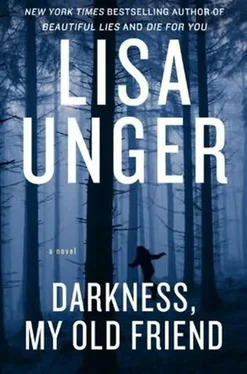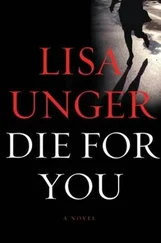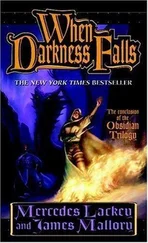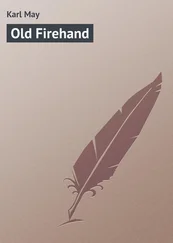She had thought that. She’d figured that the silver lining of the whole incident would be that Willow never went into those woods again.
“We didn’t find anything,” Willow said. “I couldn’t remember where I’d seen him. Jolie thought I was lying. She got mad. But I wasn’t lying.”
“Well, don’t worry about Jolie. It doesn’t matter what she thinks. It doesn’t matter what anyone thinks.”
Willow rolled her eyes. It was one of those things that kids never believe. Because to a teenager it’s the only thing that matters. Even most adults never learn that lesson.
“Look,” said Bethany. “This is what we need to do moving forward. You need to focus on school. I need to focus on work. We’ll make friends and settle in eventually.”
“What about Cole? What if he calls me?”
“Well, we’ll deal with that when it happens. Okay? Just be up front with me, and we’ll work something out.”
He was going to call; Bethany knew that. He had that goofy look that boys get when they like girls, and he’d been shining it on Willow. But Bethany was planning to keep her daughter under lock and key for a while. She just didn’t want Willow to know that. Willow didn’t need an excuse for sneaking around.
“You promise?” asked Willow.
“If you keep your promises to me and do well in school, I’ll keep my promises to you.”
Willow smiled again. And Bethany smiled back. There was nothing like a cute boy to brighten the mood of a teenage girl. Maybe The Hollows was going to turn out to be the right place for them after all. Willow was going to settle in and adjust, even after this rocky, unpleasant start. Bethany was going to finish her novel. Even after the events of the day, it seemed possible, even hopeful.
“Mom,” said Willow, “you know I don’t hate you, right?”
“I know, Willow.”
At dusk Jones and Henry made their way through the trees. After everyone had cleared off, Jones had asked Henry if he’d like to take a walk. And Henry had agreed.
“It’s always a good idea to know what’s going on in the woods behind the school,” the other man had said.
As they moved deeper in the direction Willow Graves had indicated, Jones was aware of a low-grade buzz of uneasiness. As he’d mentioned to Eloise, Jones didn’t think much of coincidence. He didn’t believe in it. Didn’t like it when it occurred. So, necessarily after the graveyard encounter, he felt annoyed, off center. First there was the boy, Cole Carr. He’d just been talking to the kid’s stepmother a few hours earlier, was unofficially going to look for the kid’s mother. Then there was Michael Holt, whom Willow Graves had seen digging up something back in the woods. Jones had the cold-case file for Holt’s mother sitting on the passenger seat of his car. Willow Graves was one of his wife’s patients; he’d seen the girl and her mother, Bethany, several times coming and going from appointments. Then again, The Hollows was a small place. And it had its ways, this town. Jones Cooper wasn’t a superstitious guy, but sometimes it seemed like The Hollows had a way of encouraging paths to cross.
Henry and Jones had both walked these woods hundreds of times, in spite of endless parental and teacher warnings about the abandoned mines and condemned structures scattered throughout the acreage. But as kids they all went back there to drink and smoke and make out. They went back there to explore, to escape the eyes of authority, to make believe. There was something about it, the sighing quiet of the old-growth trees, the coolness, the light through the canopy. How suddenly you could come across a sagging barn or an old house. And yes, the mines, of course.
There wasn’t a boy in The Hollows who hadn’t walked into one of those death traps. Most of them walked out unharmed, he supposed. Now, as a parent and a cop who’d personally pulled two boys from bad falls back here, he found that the thought of kids exploring filled him with dread. But that was the hypocrisy of adulthood: You never wanted the children you cared about to do things you’d done when you were heedless of the fragility of life. He’d been hard on Ricky, too hard, only because he’d made so many mistakes himself as a young man, mistakes for which he’d paid a heavy price, for which others had paid with their lives.
“I haven’t been back here in so long,” said Henry. “I think you stop doing that when you grow up, you know. Just walking with no destination, just being outside to be outside.” Jones was feeling a little breathless from the walk, but Henry seemed energized and light on his feet. He didn’t answer Henry, because he didn’t want the other man to hear how out of breath he was.
“So what did you want to talk about, Jones?”
Jones came to a stop, pretended to look around at the trees and up at the dimming sky. The air was cool but humid; it felt like rain.
“Actually,” he said when he could breathe a little easier, “I was coming to talk to you about Marla Holt.”
“Oh,” said Henry. A frown creased his forehead. “Really? What about her?”
“Do you remember when she disappeared?”
“I do.” Henry rubbed his crown. “It was a long time ago. She ran off. She left her kids and went away with someone.”
Above them Jones heard cardinals. They were issuing the danger-alert call, a kind of shush-shush sound that cautioned the others to be still or hide. He looked up for the flash of their red feathers, but they’d hidden themselves well. In the sky above, two hawks circled.
“I remember we talked, Henry,” Jones said. “You just lived a few doors down from the Holts.”
“We did talk,” said Henry. He’d folded his arms around his middle. “Quite a bit, as I recall. It was your first case.”
“There were rumors back then.”
“Yes, I know,” said Henry. He looked down at the ground, moved some leaves with the toe of his brown leather shoe. “But Marla and I were just friends, if you can even call it that.”
“Refresh my memory.”
Henry offered a polite smile that didn’t reach his eyes. “We jogged together every so often. I’d met her out on the street one evening. She’d been running ahead of me, turned her ankle, and fell. I helped her get home, and after that we were friends. We ran in the evenings sometimes after her kids were asleep, when her husband got home from work.”
“Mack Holt didn’t have a problem with that?” asked Jones.
In the early years of his marriage to Maggie, Jones hadn’t been thrilled about his wife’s relationship with Henry Ivy. Maggie and Henry had been best friends since high school. But Jones didn’t have any female friends, and he hadn’t understood why she needed Henry. Maggie wouldn’t budge. She’d said, A man who asks you to give up your friends will, over time, ask you to give up other important parts of yourself . Over the years Jones had come to accept their friendship.
Henry shrugged. “If he did have a problem with me, she never mentioned it.”
“Did you have feelings for her?”
Henry rolled his eyes, gave Jones a weak smile. “Come on, Jones. She was a knockout. Everyone had feelings for Marla Holt. But I was-what? Twenty-five at the time, just starting as a teacher at Hollows High. I had no confidence, even less money. She was untouchable. I couldn’t believe she’d even talk to me.”
Henry started walking again; Jones followed.
“Did she ever confide in you?”
“About what? An affair, plans to run off? No. I knocked on her door for our Thursday-evening run. She told me her husband wasn’t home, that she had the baby to care for. We chatted for a few minutes.
Then I left.”
Читать дальше












